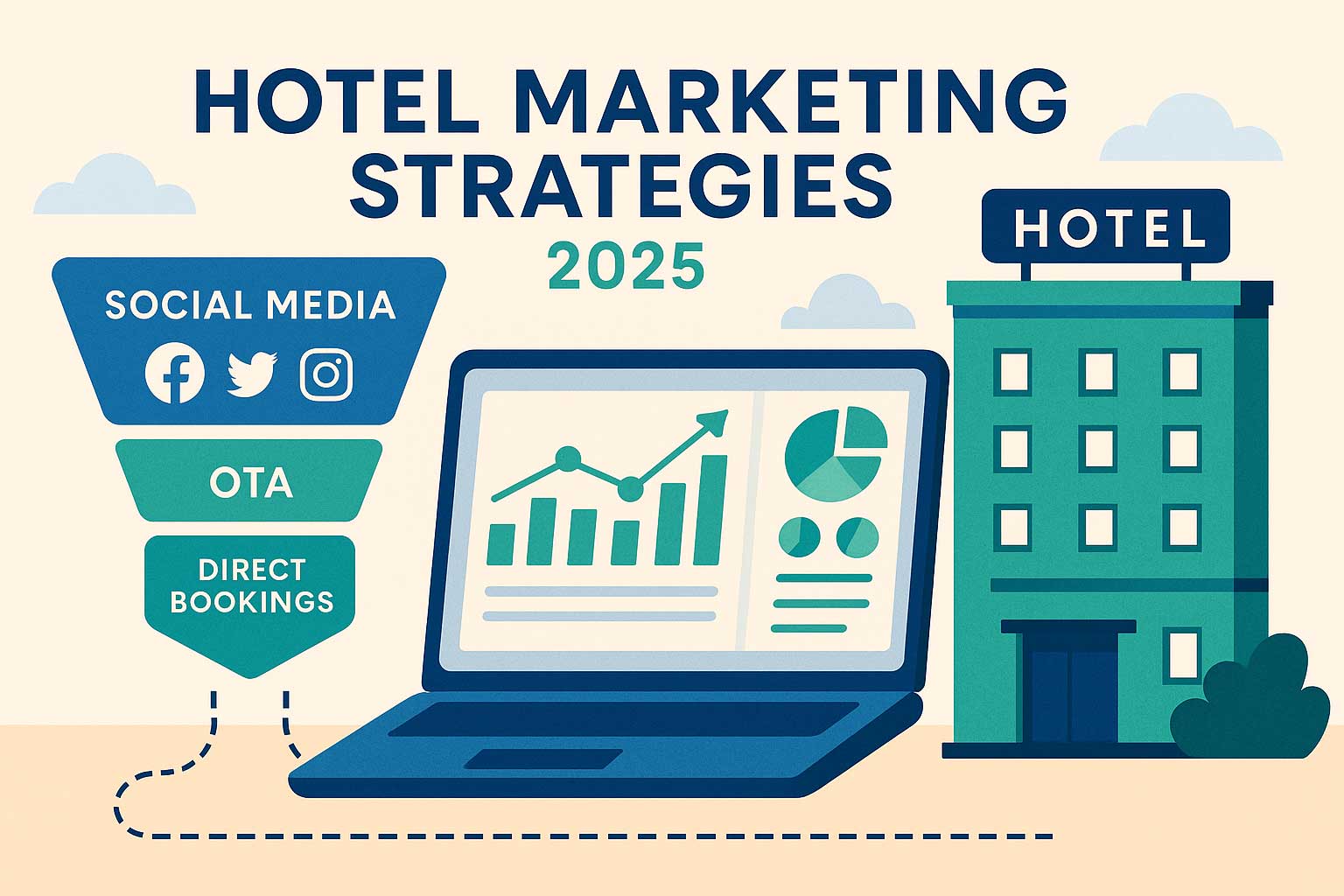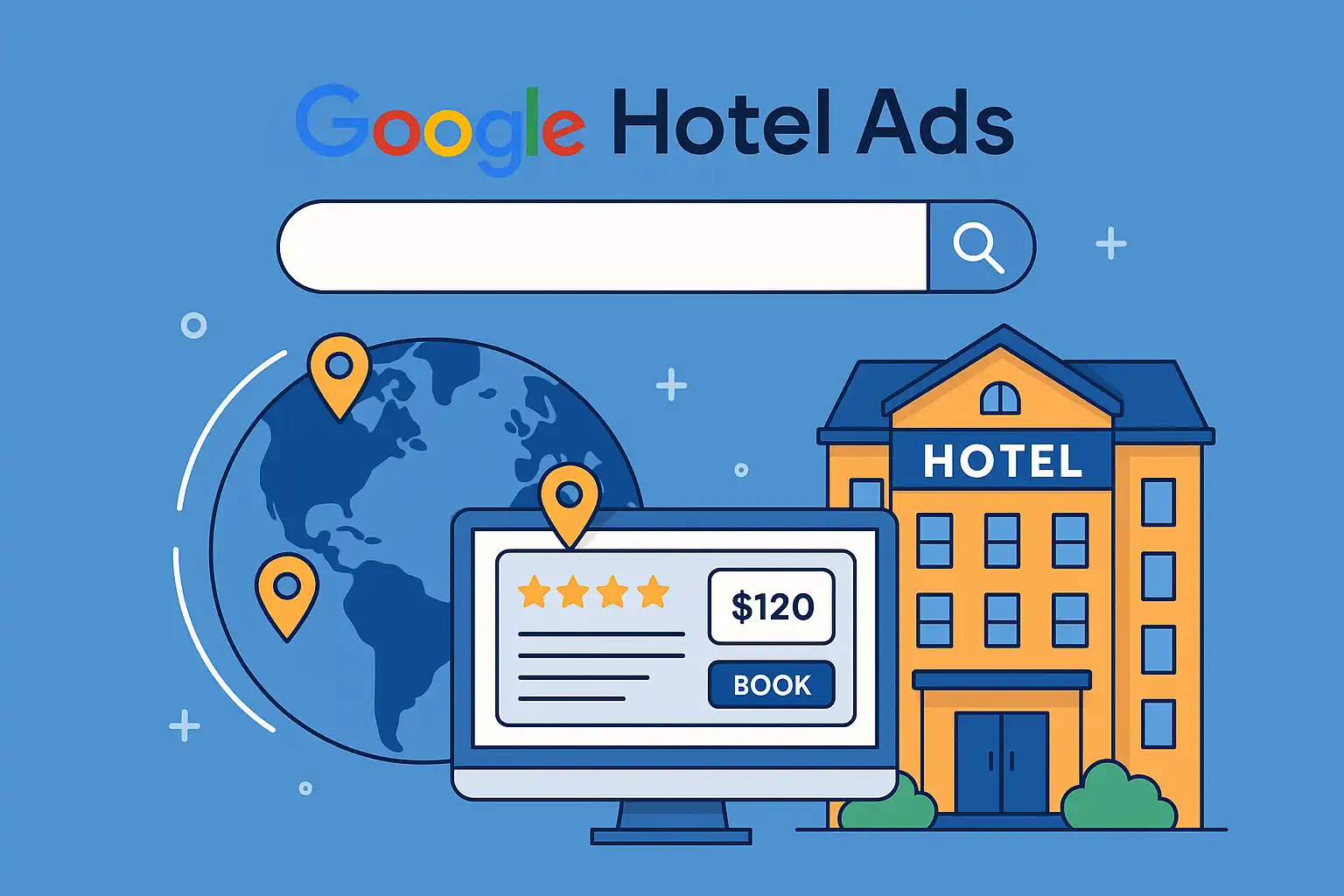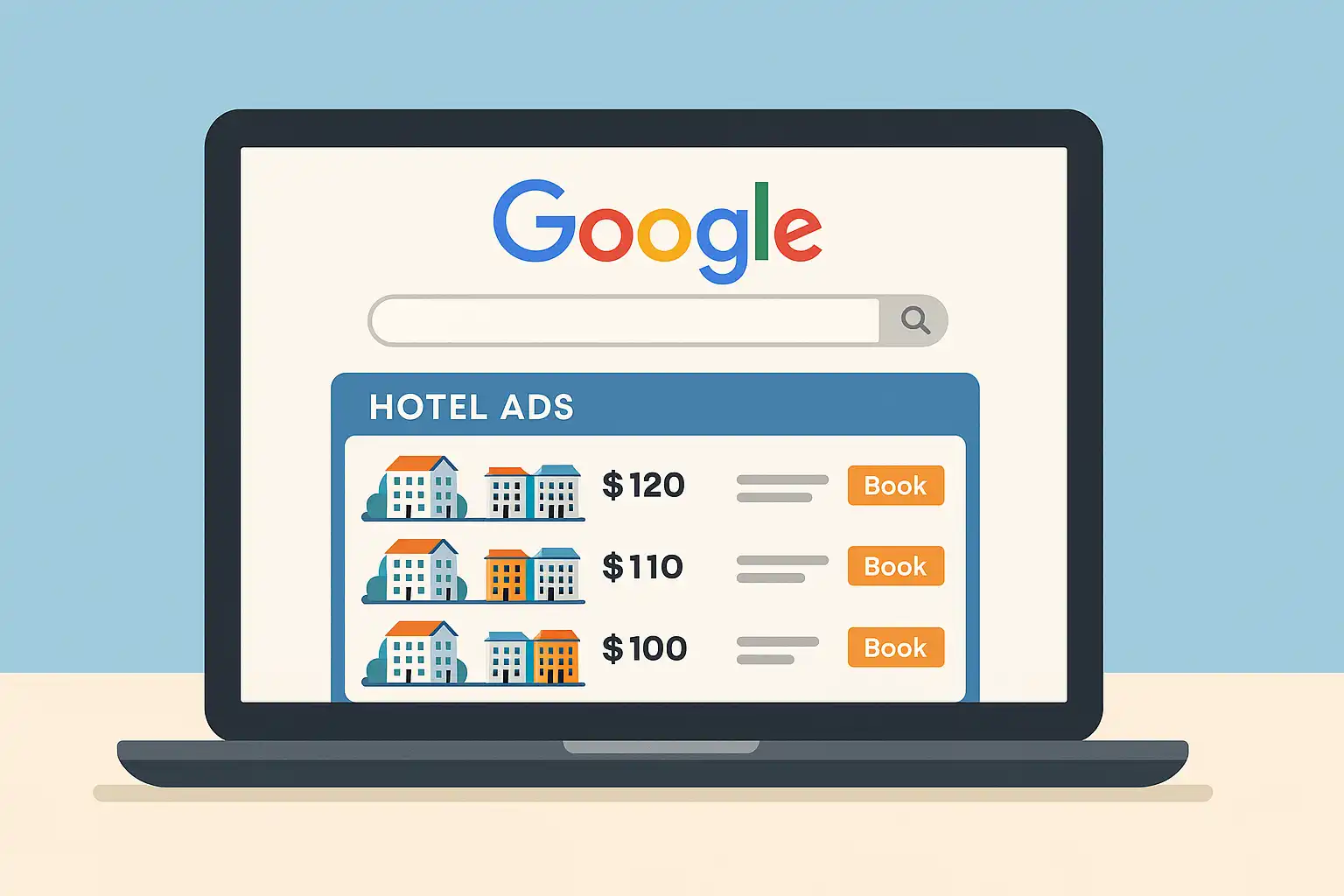Google Hotel Ads: Complete Guide to Driving Direct Bookings in 2025
Sep 21, 2025
 Mika Takahashi
Mika TakahashiPopular Categories
Hotel Technology & InnovationHotel Operations OptimizationDigital MarketingIndustry TrendsRevenue ManagementHospitality Industry
Popular Categories
Trending Post

Hotel Walk Letter Template: Professional Guest Communication

Online Travel Agents: What They Are and How They Work

Hotel Security Systems: Modern Protection Solutions

Hotel Advertising: Complete Guide to Boost Bookings and Revenue

25 Hotel Marketing Strategy Ideas for 2025: Complete Guide

AI Reservation Agent: Revolutionizing Hotel Booking and Guest Experience

PMS Communication: Streamlining Property Management Through Effective Guest Messaging
Table of contents
In 2025, hotels are paying up to 25% commission to OTAs like Booking.com and Expedia, making direct bookings more crucial than ever for profitability. With travelers increasingly starting their accommodation searches on google search, hotels need a strategic approach to capture these high-intent customers before they book through third-party platforms.
Google hotel ads offer a powerful solution to this challenge, allowing hotels to display their rates, availability, and amenities directly in google search results and google maps. This comprehensive guide will show you how to leverage this tool designed to drive more direct bookings, reduce OTA dependency, and maximize your ad spend efficiency.
Whether you’re managing a boutique property or a global hotel chain, understanding how google hotel ads work can transform your digital marketing strategy and send customers directly to your booking engine instead of expensive OTA platforms.
What Are Google Hotel Ads?
Google hotel ads are paid advertising placements that appear when travelers search for accommodation on google search, google maps, and youtube. Unlike traditional google ads, these specialized hotel campaigns display rich content including real-time pricing, photos, amenities, availability, and direct booking links.
The key difference between paid hotel ads and free google business profile listings lies in placement and control. While your property may appear in organic search results through your business profile, paid ads guarantee prominent visibility above organic results and provide enhanced features like rate comparisons and instant booking capabilities.
These ads appear across multiple google platforms:
- Google Search: At the top of search results when users search for hotels in specific locations
- Google Maps: Integrated within map results showing nearby properties
- Mobile devices: Optimized for mobile searches, which account for over 60% of travel-related queries
- YouTube: Through google’s advertising network when travelers watch travel-related content
The integration with google’s hotel booking module creates a seamless user experience. When travelers click your ad, they can immediately view detailed property information, compare rates from different booking channels, and complete their reservation through your direct booking link or preferred partners.

How Google Hotel Ads Work
The google hotel ads system operates through a sophisticated auction process that considers multiple factors beyond just your bid amount. Understanding this process is crucial for managing successful campaigns that drive quality bookings.
Step-by-Step Process from Search to Booking
When a traveler searches for accommodation, google’s algorithm instantly evaluates participating hotels based on relevance, quality, and bid amounts. The auction happens in milliseconds, determining which properties appear and in what order.
The process begins when you create a hotel center account to manage your property’s data and rates. This centralized platform connects your booking engine with google’s advertising system, ensuring real-time inventory and pricing updates.
Your certified integration partner plays a critical role in this process, automatically syncing your availability, rates, and property details. This real-time connectivity prevents overbookings and ensures travelers see accurate information when they discover your property through their searches.
Auction System and Quality Factors
Google evaluates several factors when determining ad placement:
- Bid amount: How much you’re willing to pay per user clicks or completed booking
- Property quality: Based on guest reviews, photos, and amenity details
- Relevance: How well your property matches the traveler’s search criteria
- Landing page experience: The quality and speed of your booking website
- Historical performance: Past conversion rates and guest satisfaction
Device type, location, and other factors also influence the auction. Mobile searches often have different competition levels compared to computers, and domestic travelers may see different results than international visitors searching for the same property.
Hotel Center Account Management
Your hotel center account serves as the command center for all google hotel campaigns. This platform allows you to:
- Upload and manage property photos and amenity information
- Set pricing strategies and promotional offers
- Link multiple booking engines and integration partners
- Monitor performance metrics and booking data
- Configure rate settings and availability windows
The system requires accurate, complete property information to maximize visibility. Hotels with comprehensive profiles including high-quality photos, detailed amenities, and verified business information typically achieve better performance than those with minimal data.
Google Hotel Ads Pricing and Cost Structure
Google hotel ads operate on a performance-based pricing model that aligns your advertising costs with actual business results. Understanding these cost structures helps you budget effectively and compare the value against other marketing channels.
Commission-Based Model
The primary pricing model charges a commission of 10-15% per completed booking. This means you only pay when a guest actually completes their stay, not when they simply book or visit your website. This performance-based approach reduces risk compared to traditional advertising where you pay regardless of results.
Payment timing is crucial: google charges commissions only for confirmed bookings, excluding cancellations and no shows within a 3-day reporting window. This grace period protects hotels from paying for bookings that don’t generate revenue.
For comparison, most OTAs charge 15-25% commission, making google hotel ads a more cost-effective channel for direct bookings. When guests book directly through your website after clicking your ad, you avoid the higher OTA fees while maintaining full control over the guest relationship.
Cost-Per-Click (CPC) Bidding Option
Advanced users can choose CPC bidding for more granular control over their ad spend. With this model, you pay a fixed amount each time someone clicks your ad, regardless of whether they complete a booking.
CPC bidding works best for hotels with:
- High-converting booking engines
- Strong direct booking websites
- Sophisticated tracking and analytics capabilities
- Experience managing google ads campaigns
The CPC model requires careful bid management and budget monitoring, as costs accumulate with each click rather than only successful bookings.
Factors Affecting Costs
Several variables influence your actual advertising costs:
Location competition: Properties in high-demand destinations like New York or Paris typically face higher costs due to increased competition among hotels and OTA platforms.
Seasonality: Peak travel periods drive up costs as more hotels compete for limited ad space. Budget allocation should account for these seasonal variations.
Market size: Smaller markets often have lower costs but also reduced search volume. Large metropolitan areas offer more potential customers but at higher acquisition costs.
Property type: Luxury hotels often see higher costs per booking but also higher average daily rates, while budget properties may achieve lower costs with smaller profit margins.
Performance Benchmarks and Conversion Rates
Industry data shows google hotel ads achieve an average conversion rate of 3.55%, compared to 4.72% for standard google ads campaigns. However, hotel-specific campaigns often perform better when properly optimized.
Top-performing hotel campaigns report:
- Conversion rates between 5-8% during peak booking periods
- Return on ad spend (ROAS) ratios of 4:1 to 8:1
- Direct booking increases of 15-40% within the first quarter
- Cost per acquisition 20-30% lower than OTA channels
These benchmarks vary significantly by property type, location, and market conditions. Boutique hotels often achieve higher conversion rates due to unique positioning, while chain properties benefit from brand recognition and loyalty programs.
Key Benefits for Hotels
Google hotel ads provide strategic advantages that extend beyond simple visibility improvements. These benefits directly impact your bottom line by reducing distribution costs and increasing guest lifetime value.
Increased Visibility in Google’s Dominant Market
With google controlling over 90% of search market share globally, hotel ads provide access to the world’s largest pool of travel searchers. This massive reach ensures your property appears when potential guests are actively searching for accommodation in your area.
The platform’s integration across multiple google services creates numerous touchpoints throughout the traveler’s journey. A potential guest might first see your property on google maps while researching a destination, encounter your ad during a direct search, and finally book after watching a travel video on youtube where your property appears in related advertising.
Direct Competition with OTAs
Google hotel ads level the playing field by allowing independent hotels to compete directly with well-funded OTA platforms. Your property can appear above or alongside Booking.com and Expedia results, giving travelers the option to book directly with you rather than through intermediaries.
This competitive positioning is particularly valuable because travelers often prefer booking directly with hotels when the rates and amenities are comparable. Direct bookings allow you to provide personalized service, loyalty program benefits, and special amenities that aren’t available through OTA platforms.
Targeted Advertising Capabilities
The platform’s sophisticated targeting options help you reach the most valuable potential guests:
- Geographic targeting: Focus on specific countries or regions where your ideal guests originate
- Date-based targeting: Adjust bids for high-demand periods when you can command premium rates
- Device targeting: Optimize campaigns differently for mobile versus desktop users
- Demographic targeting: Tailor messaging to specific traveler segments
Cost Control and Budget Management
Unlike traditional advertising channels, google hotel ads offer flexible budget management that adapts to your business needs. You can:
- Set daily, monthly, or seasonal budget limits
- Adjust spending based on occupancy levels
- Pause campaigns during sold-out periods
- Scale investment during low-demand periods to drive incremental bookings
The commission-based model ensures you only pay for actual results, making budget planning more predictable compared to traditional advertising where costs are disconnected from revenue generation.
Competing with Online Travel Agencies
The ability to bypass OTA commission fees represents one of the most significant financial benefits. When guests book directly after clicking your google hotel ad, you save the 15-25% commission typically paid to OTAs while paying only the 10-15% google commission.
This 5-15% difference in distribution costs can significantly impact profitability, especially for properties with tight margins. Additionally, direct bookings provide complete guest data, enabling personalized communication, upselling opportunities, and loyalty program enrollment.
Rate parity strategies become crucial when competing with OTAs. Many successful hotels offer exclusive perks for direct bookings - such as free breakfast, room upgrades, or flexible cancellation policies - that justify booking directly even when rates are identical.

Setting Up Google Hotel Ads for Your Property
Successfully launching google hotel ads requires careful preparation and technical integration. This process typically takes 2-4 weeks to complete, depending on your property’s current digital infrastructure.
Prerequisites and Account Setup
Before creating hotel campaigns, ensure you have these essential components:
Verified Google Business Profile: Your property must have a claimed and verified listing with accurate business information, photos, and contact details. This profile serves as the foundation for your hotel ads and affects quality scores.
Hotel Center Account: This dedicated platform manages your property data, rate information, and booking engine connections. Create your account at google.com/travel/partners and complete the property verification process.
Functional Booking Engine: Your website must include a reliable, secure booking system that can handle the traffic volume generated by google ads. The booking process should be mobile-optimized since over 60% of travelers search and book on mobile devices.
Real-Time Availability System: Google requires live inventory updates to prevent overbookings and ensure rate accuracy. Your property management system must sync with your booking engine to provide real-time room availability.
Required Booking Engine Integration
The technical integration between your booking engine and google’s system is crucial for campaign success. This integration enables:
- Automatic rate and availability updates
- Prevention of overbooking situations
- Accurate pricing display across all platforms
- Seamless guest experience from ad click to booking completion
Your booking engine must meet google’s technical requirements, including secure payment processing, mobile responsiveness, and fast loading times. Properties with slow or unreliable booking systems often see higher abandonment rates and lower conversion performance.
Certified Integration Partners
Google works with over 200 certified integration partners who facilitate the technical connection between your property and the advertising platform. These partners include:
Channel Managers: Prostay, RoomCloud, and similar platforms that manage distribution across multiple booking channels while maintaining rate parity.
Booking Engine Providers: Companies that specialize in hotel reservation systems with built-in google integration capabilities.
All-in-One Solutions: Comprehensive platforms that combine property management, channel distribution, and marketing tools in unified systems.
Choosing the right integration partner depends on your property size, technical requirements, and budget. Larger properties often benefit from enterprise-level solutions, while smaller hotels may prefer simpler, cost-effective options.
Property Data Accuracy and Optimization
Complete, accurate property information significantly impacts ad performance. Optimize these elements:
High-Quality Photos: Upload at least 10-15 professional photos showcasing rooms, amenities, dining areas, and exterior views. Images should be high-resolution and reflect your property’s current condition.
Comprehensive Amenity Lists: Include all relevant amenities such as Wi-Fi, parking, fitness centers, pools, restaurants, and business facilities. Detailed amenity information helps travelers make informed decisions and improves ad relevance.
Accurate Contact Information: Ensure phone numbers, addresses, and website links are current and functional. Incorrect contact information can negatively impact quality scores and guest experience.
Compelling Property Descriptions: Write clear, engaging descriptions that highlight your property’s unique features and location advantages. Avoid generic language and focus on specific benefits that differentiate your hotel from competitors.
Linking Hotel Center to Google Ads Account
The final setup step connects your hotel center account with your google ads account for campaign management. This integration allows you to:
- Create and manage hotel campaigns alongside other advertising efforts
- Access advanced bidding and targeting options
- Monitor performance metrics and conversion data
- Implement remarketing campaigns for previous website visitors
This connection also enables access to google’s automated bidding features, which use machine learning to optimize bids based on the likelihood of booking conversion.
Google Hotel Ads Management Best Practices
Effective campaign management requires ongoing optimization and strategic decision-making. The most successful hotels treat google hotel ads as a dynamic channel that requires regular attention and adjustment.
Campaign Optimization Strategies
Successful optimization begins with proper campaign structure. Organize campaigns by property type, location, or target market to enable granular performance monitoring and budget allocation.
Bid Management: Start with moderate bids and adjust based on performance data. Increase bids for high-converting time periods and reduce spending during low-demand periods. Monitor competitor activity and adjust positioning accordingly.
Quality Score Improvement: Focus on factors that improve your quality score, including booking engine speed, mobile responsiveness, and positive guest reviews. Higher quality scores reduce costs and improve ad placement.
Seasonal Adjustments: Implement bid modifiers for different seasons, events, and local factors that affect demand. Properties in ski destinations should increase bids during winter months, while beach resorts may focus on summer periods.
Budget Allocation Strategies
Effective budget management balances consistent visibility with cost efficiency:
Critical Booking Periods: Allocate larger budgets during your property’s peak booking windows, typically 30-90 days before travel dates depending on your market segment.
Off-Peak Investment: Maintain moderate spending during slower periods to capture deal-seeking travelers and maintain brand visibility.
Event-Based Adjustments: Increase budgets during local events, conferences, or festivals that drive accommodation demand in your area.
Market Testing: Reserve 10-20% of your budget for testing new targeting options, bid strategies, or campaign structures.
Performance Monitoring and Analytics
Regular performance analysis identifies optimization opportunities and ensures campaign effectiveness:
Key Metrics to Track:
- Conversion rate (bookings per click)
- Cost per acquisition
- Average daily rate for google-sourced bookings
- Revenue attribution and return on ad spend
- Booking lead time patterns
Weekly Reviews: Analyze performance weekly to identify trends and make timely adjustments. Look for patterns in device performance, geographic conversion rates, and seasonal variations.
Monthly Optimization: Conduct deeper analysis monthly, including competitor research, bid strategy evaluation, and budget reallocation based on performance data.
Advanced Campaign Strategies
Sophisticated hotels implement advanced techniques to maximize performance:
Automated Bidding Rules: Set up rules that automatically adjust bids based on occupancy levels, time until travel date, or conversion performance. This ensures optimal positioning without constant manual intervention.
Geographic Targeting Refinement: Analyze booking data to identify your most valuable source markets and adjust targeting accordingly. Focus additional investment on regions with high conversion rates and premium average daily rates.
Device-Specific Optimization: Create separate bid strategies for mobile devices, tablets, and computers based on their respective conversion patterns and guest value.
Remarketing Integration: Implement remarketing campaigns to re-engage users who visited your website but didn’t complete a booking. These campaigns often achieve higher conversion rates at lower costs.
Latest Google Hotel Ads Updates in 2025
Google continues evolving its hotel advertising platform to improve user experience and provide better tools for hotel marketers. Understanding these updates helps you stay competitive and take advantage of new features.
New Dual-Section Format
The most significant since 2024 update introduced a dual-section format separating paid ads from organic listings. The top section displays up to four paid hotel ads, followed by a clearly labeled “All Options” section showing free listings.
This change provides clearer distinction between paid and organic results while maintaining prominent placement for advertising hotels. The paid section receives priority visibility, making google hotel ads even more valuable for properties competing in crowded markets.
Enhanced Mobile Experience
Mobile optimization improvements focus on faster loading times and streamlined booking processes. Google reports that mobile conversion rates have increased by an average of 15% following these updates.
Key mobile enhancements include:
- Simplified booking forms optimized for smaller screens
- Improved photo galleries with swipe navigation
- Enhanced google maps integration for location-based searches
- Faster payment processing and guest information capture
Improved Filtering and Search Options
Travelers now have more sophisticated filtering options, including:
- Refundable rate filters that highlight flexible booking options
- Enhanced amenity filtering for specific facilities like pools, spas, or pet-friendly policies
- Price range filters that help travelers find accommodations within their budget
- Guest rating filters that emphasize highly-reviewed properties
These improvements help qualified travelers find your property more easily while reducing irrelevant clicks that don’t convert to bookings.
Expanded Global Availability
Google hotel ads expanded to additional countries in 2025, with improved currency support and localized features. This expansion creates opportunities for hotels in emerging markets and those targeting international travelers.
New features include:
- Multi-currency pricing display for international guests
- Localized content support for non-English markets
- Enhanced translation capabilities for property descriptions
- Regional payment method integration
Integration with Google Travel Planning
Google’s broader travel ecosystem integration allows hotels to appear throughout the travel planning process. Your property might appear when travelers search for flights to your destination, research local attractions, or explore itinerary options.
This expanded visibility creates additional touchpoints without requiring separate campaigns, effectively extending your advertising reach across google’s travel-related services.
Common Challenges and Solutions
Even well-executed google hotel ads campaigns face challenges that require strategic solutions. Understanding these common issues helps you prepare for and address them proactively.
Rate Parity Maintenance
Maintaining consistent rates across all booking channels while offering compelling reasons to book directly requires careful strategy:
Solution: Implement a “best rate guarantee” policy that matches any lower rate found elsewhere while adding exclusive perks for direct bookings. Consider offering valuable add-ons like breakfast, Wi-Fi, or parking that don’t significantly impact your costs but provide clear guest value.
Monitoring Tools: Use rate shopping tools to monitor competitor pricing and ensure your direct rates remain competitive with OTA offerings across all major booking platforms.
Managing Increasing Operational Costs
Rising advertising costs and inflation impact hotel marketing budgets, requiring more efficient campaign management:
Budget Optimization: Focus spending on your highest-converting customer segments and time periods. Reduce investment in underperforming areas and reallocate budget to proven revenue drivers.
Quality Score Focus: Improve your quality scores through better website experience, faster booking processes, and positive guest reviews. Higher quality scores reduce costs while improving ad placement.
Alternative Bidding Models: Test commission-based bidding during uncertain periods to align costs directly with revenue generation rather than paying for clicks that may not convert.
Content Freshness and Optimization
Keeping property information current and engaging requires ongoing attention:
Regular Photo Updates: Refresh photos quarterly to reflect seasonal changes, renovations, or new amenities. Fresh, high-quality images improve click-through rates and conversion performance.
Review Management: Actively manage guest reviews across google and other platforms. Respond professionally to feedback and use insights to improve both service quality and marketing messaging.
Amenity Updates: Keep amenity listings current as you add or modify property features. Accurate information prevents guest disappointment and negative reviews that can impact future performance.
Balancing Direct Bookings with OTA Relationships
Aggressive direct booking strategies can strain relationships with OTA partners who provide valuable distribution reach:
Diplomatic Approach: Focus on offering unique value for direct bookings rather than competing solely on price. Emphasize personalized service, loyalty benefits, and exclusive amenities.
Channel Mix Strategy: Maintain strategic OTA relationships for market segments where they provide clear value, such as international markets or last-minute bookings, while driving direct bookings for your core customer base.
Data Utilization: Use booking data from all channels to understand guest preferences and optimize your direct booking value proposition based on what matters most to your target travelers.
Maximizing ROI with Google Hotel Ads
Success with google hotel ads requires treating it as a comprehensive revenue management strategy rather than just another advertising channel. Properties that achieve the best results integrate these campaigns with their broader marketing and revenue optimization efforts.
The commission-based pricing model makes google hotel ads particularly attractive for hotels focused on profitability rather than just occupancy. By paying only for completed bookings, you can invest more aggressively in periods when you need incremental revenue while reducing costs during high-demand periods.
Start with conservative budgets and bid amounts while you gather performance data and optimize your booking engine for conversion. Most hotels see meaningful results within 30-60 days, with full optimization typically taking 3-6 months of consistent management and refinement.
Remember that google hotel ads work best as part of a comprehensive direct booking strategy that includes website optimization, email marketing, loyalty programs, and social media engagement. The goal isn’t just to reduce OTA dependency, but to create a sustainable competitive advantage through superior guest relationships and revenue management.
Ready to reduce your OTA dependency and boost direct bookings? Start by setting up your hotel center account today and take the first step toward more profitable, direct guest relationships.
